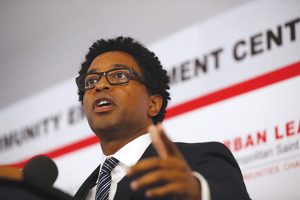Roorda says Bell ‘doesn’t like the union they’ve selected’
By TIM ROWDEN
Editor

Jeff Roorda, business manager for the St. Louis Police Officers Association (SLPOA), which assistant prosecutors and investigators in the St. Louis County Prosecutor’s office voted to join in December, says Prosecutor Wesley Bell is union busting, because “he doesn’t like the union they’ve selected.”
Bell, says he supports workers’ right to unionize, but thinks it is a conflict of interest for his staff to join the union representing city police officers.
“This presents an inherent conflict of interest,” Bell said in a statement released to the media last week. “I have not been provided any valid reason as to why the members of the ‘bargaining unit’ can’t choose a non-law enforcement union that does not present an inherent conflict of interest.”
‘EXACT OPPOSITE OF A CONFLICT’
There are two problems with Bell’s allegation.
The first is the St. Louis Police Officers Association (Lodge 68 of the Fraternal Order of Police) represents St. Louis City police officers, not the St. Louis County police officers who submit cases to the county prosecutor’s office. The county officers are represented by the St. Louis County Police Officers Association (Lodge 111 of the Fraternal Order of Police), which assistant prosecutors intentionally chose not to join because of the potential problems that might cause.
 “This is the exact opposite of a conflict,” Roorda said. “We went out of our way to avoid a conflict in this situation, and it was a very conscious, active decision by both the bargaining unit and our union.”
“This is the exact opposite of a conflict,” Roorda said. “We went out of our way to avoid a conflict in this situation, and it was a very conscious, active decision by both the bargaining unit and our union.”
When St. Louis County prosecutors decided to unionize last fall, they sought the advice of Pat White, president of the St. Louis Labor Council.
White conferred with the Missouri AFL-CIO and recommended the prosecutors contact the International Association of Fire Fighters, which represents assistant prosecutors in the Kansas City area, or Laborers Local 42, which represents some police bargaining units.
However, neither of those unions were in a position to take on the assistant prosecutors.
COMPLICATED BY PASSAGE OF HB 1413
The second problem with Bell’s allegations comes from the passage last year of House Bill 1413 (HB 1413), a so-called “paycheck protection” measure designed to weaken the ability of public-sector employees to bargain for better wages and working conditions.
The new law, which took effect Aug. 28, greatly complicates the process for the assistant prosecutors, or other public sector employees, to organize a new bargaining unit or bargain a fair contract.
Among other things, the law:
• Prohibits bargaining over most working conditions
• Allows employers to unilaterally change labor agreements
• Prohibits strikes, picketing or demonstrations of any kind, and makes employees who engage in any such action subject immediate firing.
• Creates unnecessary and burdensome bureaucratic hoops for unions to represent their members by requiring government employees – other than fire fighters, police and other first-responders – to “opt-in” annually to have their union dues withdrawn from their paychecks.
The law exempts police, fire fighters, and other public safety employees represented by a law enforcement or public safety union, but not those same employees if they are represented by a trade union.
For Bell to suggest that there was no “valid reason” why assistant prosecutors couldn’t choose a non-law enforcement union ignores the reality that passage of HB 1413 left prosecutors with a narrow choice: join a public safety union representing police or fire fighters, or find their path to a first contract and a voice on the job effectively blocked.
STEPS TOWARD ORGANIZING
The SLOPA organized an authorization drive in November, about two months before Bell, who defeated longtime county prosecutor Robert McCulloch in the August election, took office.
Roorda said about 65 percent of the 55-member bargaining unit – which includes non-supervisory prosecutors and investigators – signed authorization cards, setting the stage for voluntary recognition by the prosecutor’s office or an election.
The SLPOA asked for voluntary recognition from the prosecutor’s office and Bell’s transition team, but received no response.
When the union demanded an election, Roorda said, there was resistance from the County Counselor’s office, which argued that under the rules of HB 1413 a majority “Yes” vote from a majority of people in the bargaining unit was required to win union recognition, rather than simply a majority of those voting.
The SLPOA argued that HB 1413 did not apply since the prosecutors were voting to join a public safety union.
The County Counselor and the Prosecutor’s offices ultimately agreed, the election was held, and the union prevailed.
“There was never a step in this where the county wasn’t in agreement, in written agreement. They signed a stipulation agreeing to the terms of the election,” Roorda said. “And there was never a time where Mr. Bell didn’t have a chance to voice his objections as the prosecutor-elect.”
Shortly after taking office, Bell tried to short-circuit the process, requesting an advisory opinion from the Supreme Court Advisory Commission that his lawyers were engaged in unethical behavior for attempting to join a union, for attempting to unionize. The Supreme Court rejected the request.
LABOR COUNCIL STANDING BEHIND PROSECUTORS, SLPOA
The SLPOA has been trying to get the county and prosecutor’s office sit down for bargaining, but that demand has fallen on deaf ears. Roorda met with the Labor Council Executive Board last week asking the Council to express its support for the assistant prosecutors’ effort to unionize and bargain a first contract.
 White said the Council would send a letter to that effect to Stenger and Bell, encouraging them to begin negotiating with the union.
White said the Council would send a letter to that effect to Stenger and Bell, encouraging them to begin negotiating with the union.
“Even though the Fraternal Order of Police isn’t part of the Council, all of the folks around this table believe that regardless of whether you’re a doctor or a lawyer or a trash man, if you want to organize and be in a union, we support of that,” White said. “I let County Executive Steve Stenger’s administration (the de-facto employer of assistant prosecutors and investigators) know that even if they’re not affiliated, if there’s a majority of people in an office that want to be in a union that we support that.”

